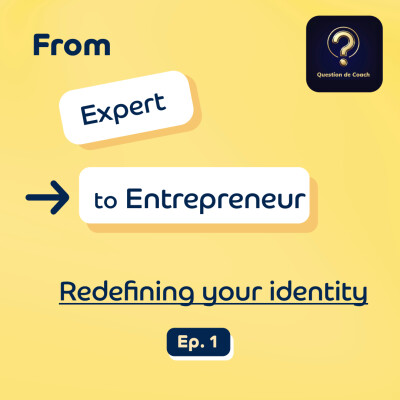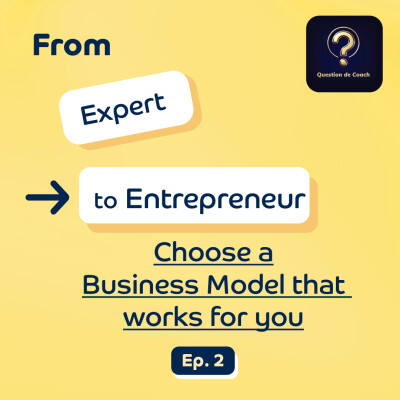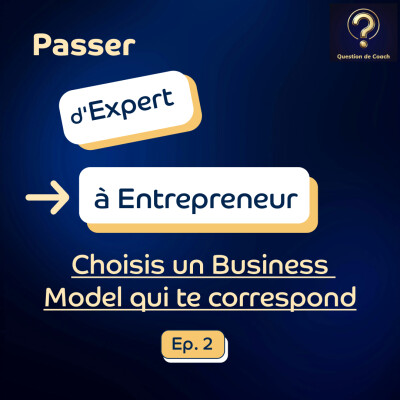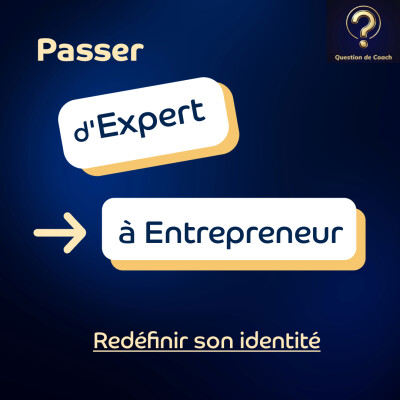Speaker #1isn't just philosophical, it's practical. Your answer falls the foundation of your entrepreneurial journey and it's probably one of the biggest change you face when moving from expert to entrepreneur. This is what I don't see coming. So today, let's break this down into three key sections. First, we'll explore why corporate titles limit your sense of self. Second, We'll discuss how your values and strengths should form the core of your business identity. And finally, I share a practical exercise. I love being practical. So I share a practical exercise I call the personal manifesto to help you reconnect with your authentic professional self. So let's start. Let's start with corporate titles and why they can be so limiting. In the corporate world, titles, they serve a purpose. They establish hierarchy. They communicate expertise. They define responsibilities. This is all necessary for a large organization to function efficiently. But there's a huge downside. These titles, they can become containers that hold us in. They can shape how we see ourselves. And most importantly, how others see us. They can start to define us in ways that go far beyond the intended purpose of efficiency. When I was at KPMG, my identity was learning and development team leader. And that meant something specific. It meant I had certain skills, a certain level of experience, and a certain place and responsibility in the organization. It provided a shorthand for others to understand my professional value. The problem arises when we internalize these titles so deeply. And God, did I do that. When we begin to believe that our value comes from the title rather than the other way around, when we forget that the title is just a label for a subset of our capabilities and not the sum total of who we are, this is where the transition to entrepreneurship can be so drawing. Suddenly, that external validation that you have from your title, it's gone. That shorthand no longer works. And we're left asking, what is my value without this title? Who am I professionally if I am not learning and development team leader or manager XYZ or whatever your equivalent might be? So I've coached many professionals, especially this year, through this transition. And I've noticed that this identity question, it creates three common challenges. First, there's the confidence gap. Without the backing of a respected organization, many new entrepreneurs question whether they are truly enough expertise or authority or if they are able to stand on their own. That's the confidence gap. The second challenge is the positioning problem. How do you describe now what you do? It's no longer encapsulated in a neat corporate title. So how do you position yourself? And third, there's the value question. How much are you worth without the pricing structure of your former employer? All these three challenges stem from the same root. And the same root cause. This is it. You've been defining yourself. through an external framework rather than from your value within. So this brings us to the second key point, reconnecting with your values and your strengths at the foundation of your entrepreneurial identity. The truth is, your corporate title never really defined you. It was just a convenient label. The real professional value you brought was always about your unique combination of strengths, skills, experiences, values. So when you step into entrepreneurship, you're not leaving your expertise behind. You're liberating it from the constraints of a corporate role. You're taking the opportunity to express your professional self more fully and with more authenticity. But to do this efficiently or effectively, as you like, you need to get crystal clear. And you need to get crystal clear about the core strengths and your core values. What are they actually? Let me give you an example. Again, when I left KPMG, I loved them. No problem. But I had to go away to be a coach. But when I left KPMG, I had to rediscover who I was professionally. Yes, I had expertise in management consulting and learning and development and business coaching and training, but that wasn't enough to build a business around. I had to dig deeper. What I realized was that my real strengths were in helping people to clarify complex situations, seeing patterns that others missed, or facilitating transformative conversations. my core values. included independence, growth, creating meaningful impact. These insights didn't come from my title. They came from reflecting on when I felt most alive and effective in my work, regardless of what my business card or my email signature said. This self-knowledge became the foundation for my coaching practice. Not my former title, not my years at... KPMG or EY, but these essential elements of who I am professionally. And the same will be true for you. Your business should be built on your authentic strengths, your value, your expertise, and not on trying to replicate the validation that came from your corporate role. So, okay, you will say, and you will ask, how do you reconnect with these fundamental aspects? of your professional identity. And this brings us to the third part of our discussion. The exercise, the personal manifesto exercise. If this is the first time that you're listening to Question Coach, you will quickly realize this is not only theory and good ideas. I hope it is already. But there is always a practical part with an exercise, with coaching tool, with something that you can activate. And this week, it's the personal manifesto exercise. This is a fundamental exercise for... anyone wanting to build their own business. And I certainly did this exercise for myself. When I started my business four years ago, I hired a coach myself and I was super lucky to do that. What a great idea to have a coach in this fundamental career shift. So, and I certainly do this exercise nowadays with all my clients in that situation. Personal manifesto is a declaration of your professional core, the non-negotiable elements that define how you work and why. It's not about what you do, but about who you are when you're doing it. And today, I tell you how to create yours. It's three simple steps, and you will see also these three steps they are in the newsletters. So every time we are doing an exercise and you're listening to this podcast, all the details of the exercise and insights are in the newsletter. Subscribe to the newsletter and you will have every week the tool that you can aggregate. So don't miss it and subscribe to the newsletter. So how do you do that concretely? The personal manifesto exercise. Step one. You identify your professional strengths. These are just not only your skills, the skills that you learn, but also your innate capabilities, things that energize you when you use them. And ask yourself, what do I do better than most people around me? When do I feel most in flow at work? What do others consistently recognize in me? That's the first step. the professional strengths. Step two, clarify your values. These are the principles that guide your decisions and your actions. For that, ask yourself, what matters most to me in how I conduct my work? What would I refuse to compromise on, even if that meant losing an opportunity, for instance, or what kind of impact do I want to have through my work? That's step two, clarifying your values. Step three is around articulating your vision. This is about the change you want to see. This is about the thing that you want to create. Ask yourself what problem am I uniquely positioned to solve? What would success look like beyond your financial metrics and your turnover? Who do I most want to serve? Who is my ideal client and why? Once you reflect it to the three questions, so the professional strengths, the values and the vision, write a one-page declaration that captures the essence of your answers. And this will become your personal manifesto. It's a kind of a North Star for you. entrepreneurial journey. This is something that you will fall back to when you have to take a difficult decision. The power of this exercise is that it shifts your focus from external validation of the title in big corporates. It shifts that to internal clarity. It reminds you that your professional identity was always about more than your title. It was about this fundamental parts. these fundamental aspects of who you are and how you create value truly. And if you are stuck, I recommend using ChatGPT or Perplexity or Cloud or your preferred artificial intelligence. Let me share a practical tip. AI can be incredibly helpful for this exercise. And here's how to use it effectively. First, you start by writing your own thoughts on strength, value, the vision. Just like we described now, don't skip these steps. AI works best when it has your authentic input to work with. Second step, you ask your chat GPT cloud or perplexity something that, based on the strengths and values and vision I have identified, and you list them, can you help me articulate them more clearly in a professional manifesto format? And then you will use your artificial intelligence response. It's a starting point. You will then... Edit it and refine it until it truly feels like your voice and it captures really your essence, exactly what you want. It will resonate with you. You will think, oh, this is it. This is me. And at the end, I always have a little question to the artificial intelligence. I use ChatGPT and that helps me identify my blind spots. The question is, what might... I've been missing in this professional manifesto? How could I make this more distinctive? Okay, I add a question at the end. And remember, chat CPT or cloud or perplexity, any AI is a tool to enhance your thinking and not to replace it. The most powerful manifesto, they will combine your authentic insights and then the well-crafted language of the AI tool. Let me share, let me share a bit of my own personal manifesto, maybe to give you an idea. I built my career in the big four and I learned the rules of the corporate game, only to realize I was meant to rewrite them. Today, I challenge leaders and entrepreneurs to align purpose, people and performance, unlocking results they didn't believe were possible. My coaching is bold, systemic and deeply human. I see patterns in the chaos and turn them into strategy. If you work with me, expect to be challenged, transformed and equipped to lead with impact that lasts. I realize when I'm speaking out loud, I realize that sharing this with you might seem a little bit presumptuous and perhaps a little bit bold, but whatever, take it just as an example. Notice, however, that nothing in this statement gives... depends on the corporate title or external validation. It's completely self-contained and could apply to many different business models or offerings. And yes, it's poor, but it gives me the words, the narrative when I go outside and want to talk to prospects or clients or sometimes even friends and family. I know what to say about me and about my business and how to do it and why I'm doing it. This is the kind of foundation you need. as an entrepreneur, something that comes from within rather than being bestowed from without. Now, I want to acknowledge that this transition from expert to entrepreneur, this is not easy. It's normal to feel a sense of loss, even grief, when you leave behind a professional identity that may have defined you for years or even decades. It's also normal to feel uncertain or even afraid. We humans, we are wired to seek belonging and status. And corporate structure provides clear pathways for both. When you step outside those structures, the big corporates, you're venturing into territory where the rules are less clear. So here's what I observed. both from my own journey in coaching and both from coaching others. This identity shift, it's challenging. But while it's challenging, it's also profoundly liberating. There's a special kind of joy that comes from building a business that is based on who you truly are rather than who an organization needs you to be. The constraints fall away. The possibilities expand. You get to define your success on your own terms. And perhaps more importantly, you get to show up as your whole self rather than just the parts that fit neatly into a corporate role. Before we wrap up this episode, I want to leave you with a practical exercise that you can do just right now. Even if you're in the car, you can take out a piece of paper or you just remember. Three things that define you professionally that have nothing to do with your job title. So define three things. That gives you the flavor of who you are as a professional. This could be strengths, values, skills, a different approach, the impact that you have, whatever feels most essential to who you are in your work. Then add one rule that you want to set for your future business. This should be a non-negotiable. principle that would guide how you operate regardless of what services or what product you ultimately offer. So this is a simple exercise. Okay. Three things that define you professionally, your strengths, values, approach, impact, whatever, and one non-negotiable rule. This simple exercise is your first step towards building your own manifesto and ultimately An entrepreneurial identity that's authentically yours. One that won't disappear when you leave your corporate world behind. And that brings us to the end of our first episode. In the mini-series, From Expert to Entrepreneur, we explore the challenge of professional identity when transitioning from corporate expert to entrepreneurship. And I've shared the personal manifesto approach to reconnecting with your authentic professional self. So this identity shift we're discussing is exactly what we work through in my E2E Incubator program. E2E stands for From Expert to Entrepreneur. This is a structured 12-week journey designed specifically for corporate professionals like you. People from the big four, people in the consulting world, the big bank, the finance. So if you recognize yourself here, if you want to make a transition to entrepreneurship, this program is for you. Actually, this program is for me four years ago. And I'm setting up a small group, five to eight participants. maximum to work through every step of building your business foundation, from clarifying your authentic professional identity to developing your offer, pricing strategy, go-to-market plan. So everything we will talk about in the next three episodes of the podcast. This is a small introduction to the program. This is a coaching program. This is an individual and group coaching program Because I realized working with a lot of you out there that when you work together, also you learn from each other. So the E2E incubator will kick off in October with a specific goal of having you ready to launch your business in the spring of 2026. If you're interested, just look below in the description of this episode or just send me a little email. DM me on LinkedIn or Instagram and tell me just, I want in. I want to build my business in 2026. I'm ready to go, but I don't know how to do that. This program will be for you. And in our next episode, we'll build on this foundation by discussing how to translate your newly clarified identity into a compelling business offering. We'll talk about finding the intersection between what you love, what you're great at, and what the market needs. So thanks for listening to Question Coach. I'll see you next week for the next episode. Bye.





